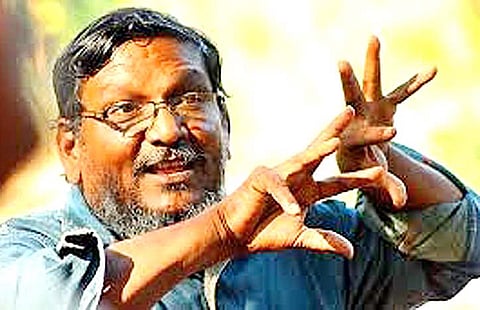

KOVILPATTI: Kovilpatti-based Tamil storyteller and novelist Konangi was recently nominated for the Vilakku Award, instituted by Vilakku Society, a cultural organization formed by a section of the Tamil Diaspora in the US. Reacting to the announcement, the author said, although he does not write for awards, such awards are a source of inspiration.
“It brings to mind a vilakku in my house, which I call Calcutta vilakku,” he says. “The lamp was gifted to my grandfather Baskaradoss by a Calcutta-based artist and was passed down to me. I keep it as the highest award. Now, this Vilakku (award) will also be one such source of inspiration.”
Born into a family of literary and theatre artists, he is one of the grandsons of legendary artist-poet and freedom fighter, Mathurakavi Baskaradoss. While his elder brother, S Tamilselvan, is also a known short-story writer, his younger brother S Murugaboopathy is a well-known theatre artist. His father MS Shanmugam, a retired land surveyor, was also a writer.
Konangi, whose original name is Ilangovan, studied up to PUC and has a diploma in cooperative society management. He got a job in the clerical cadre in a cooperate society at Kovilpatti and he says even from land records he looked for stories to tell.
Narrating one such story, he says, “There was a village called Seelankulam, which, according to land records, was located in the middle of Mel-Eeral and Keel-Eeral, Valapatti, Thambaloorani and T Shanmugapuram near Ettayapuram. The area had huge heaps of sand and housed only electrical transformers, telephone lines, and dogs.”
“It was said, during colonial times, the people of Seelankulam protested against the Ettaiyapuram Zamindar as they were affected by severe drought and were unable to pay tax. When the Zamindar’s officials came to collect the tax, they tied him to a tree. The angry Zamindar sent his army, which surrounded the village and destroyed it. Since then the village has been deserted.” He said he had collected several stories of the village from various sources and began writing a novel but was unable to complete it.
Konangi’s first short-story, Veechu, appeared in Thamarai magazine in 1980, and he has six collections, three novellas and three major novels. While many of his earlier stories like Kollanin Arupenmakkal and Mathimarkal Kathai were written in the subaltern perspective, the recent ones like Uppukathiyil Uraiyum Siruthai, Natchathiram Uthirntha Manthirachimizh to the novels such as Pazhi, Pithira and the most recent Tha, were written in the style of magical realism. When asked why the shift in style,
Konangi said, “Earlier stories were about the untold sufferings of people who lost their life due to suppression. But all stories cannot be written in the same style.”
“For example, when I roamed around the streets Hampi in Karnataka, I visualized the remnants of Vijayanagar period. When I began writing, they refused to appear in the linear style and demanded a kind of sculpting. So I invented a new styles depending on the nature of tales, he said.
On how he gave life to his stories, he says, “While my characters are highly instinctive, my stories take birth from the sub-conscious mind and often oscillate into the world of unconscious.”